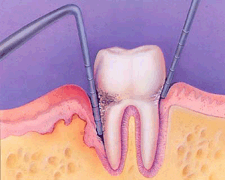المقالات
Smoking and Periodontal Disease

It's common knowledge that smoking has been linked to both lung and heart disease. To add to this, recent studies have shown that tobacco use is likely one of the most significant risk factors in the development and progression of periodontal (gum) disease. Smokers are more likely to have a buildup of tartar on their teeth, where disease-causing bacteria thrive.
Infected gums Over 4,000 chemicals Periodontal disease is an infection that attacks the bone, gums and other soft tissues surrounding the teeth. It's caused by plaque, a sticky, colorless film of food and bacteria that forms constantly on teeth. If it's not removed, plaque hardens to become tartar (also called calculus) in as little as 24 hours. Your body responds to the bacteria in plaque and tartar by sending white blood cells (the body's natural defense) to the infected area. When these white blood cells reach your gums, they release enzymes to attack the infection. Unfortunately, these protective enzymes also attack and break down the bone and soft tissue surrounding your teeth.
Left untreated, periodontal disease will worsen, causing pockets to develop between your teeth and gums. The harmful bacteria reproduce rapidly in these pockets, causing them to deepen as more bone and soft tissue are destroyed. Your teeth may become loose, painful, and may even fall out. Smoking worsens the problem by damaging the natural processes your body uses to fight the periodontal infection; it reduces saliva levels, restricts blood flow, and damages your immune system.
There are over 4000 chemicals in cigarette smoke, including formaldehyde, carbon monoxide, ammonia and arsenic. These and other chemicals in tobacco can slow down the healing process and make periodontal treatment less effective. Other tobacco products, including cigars, pipes and smokeless tobacco, contain similar toxins and produce almost exactly the same results.
Smokers are four times more likely to have advanced periodontal disease. The Center for Disease Control and Prevention reports that 41.3 percent of daily smokers over age 65 are toothless, compared to 20 percent of non-smokers. Tobacco users also suffer from a far greater incidence of bad breath, mouth sores, tooth staining, and oral cancer.
